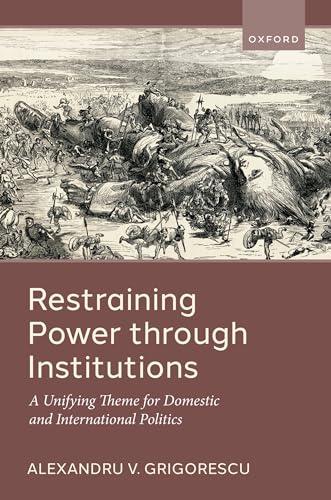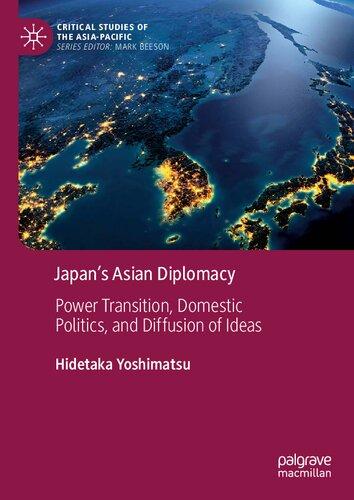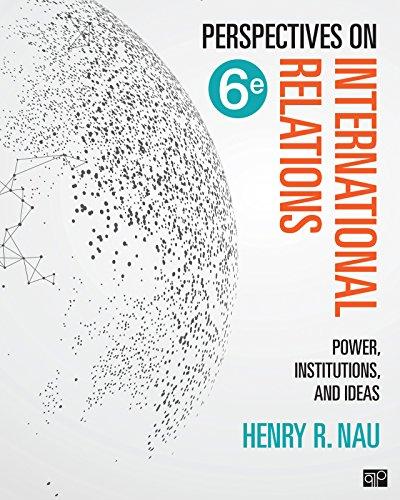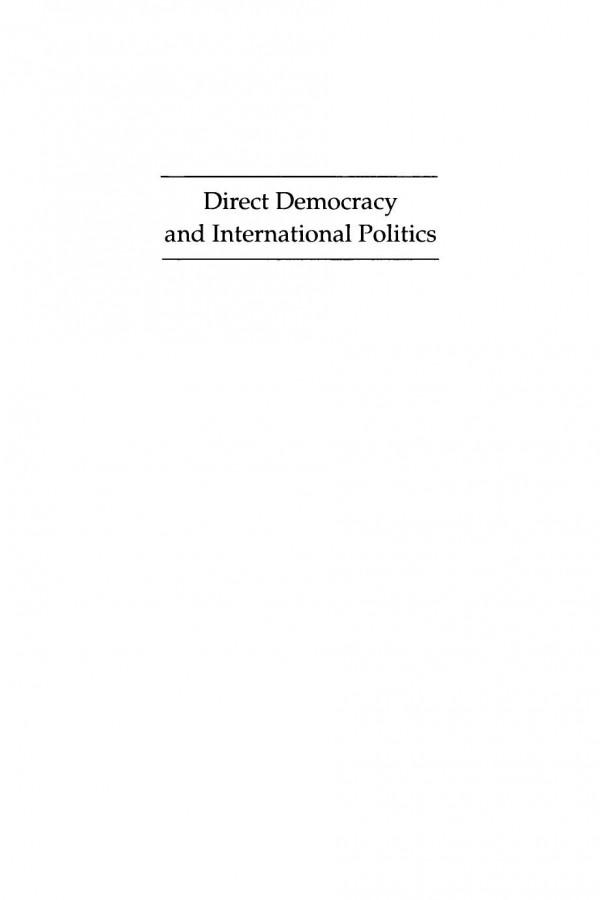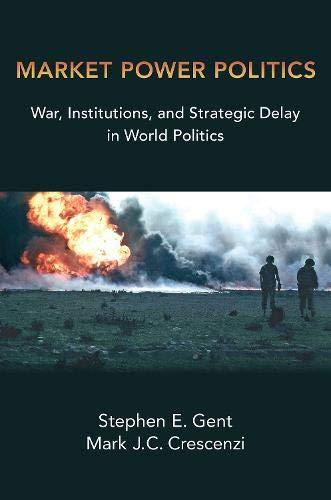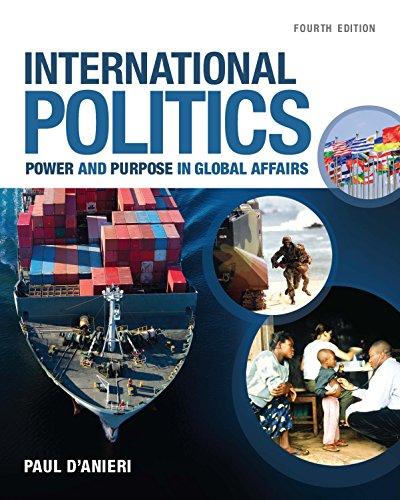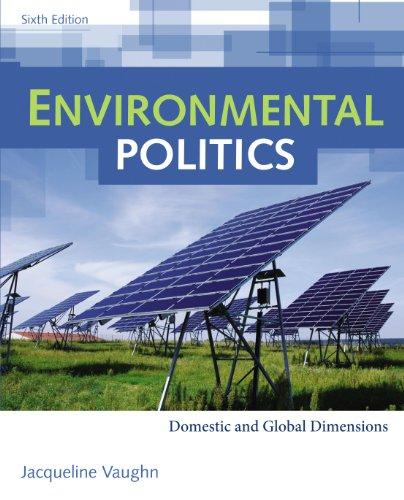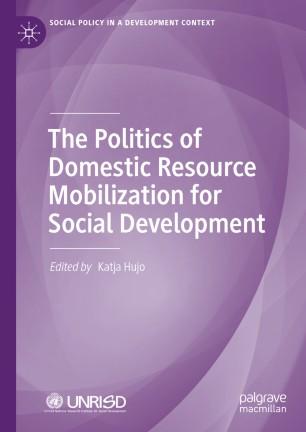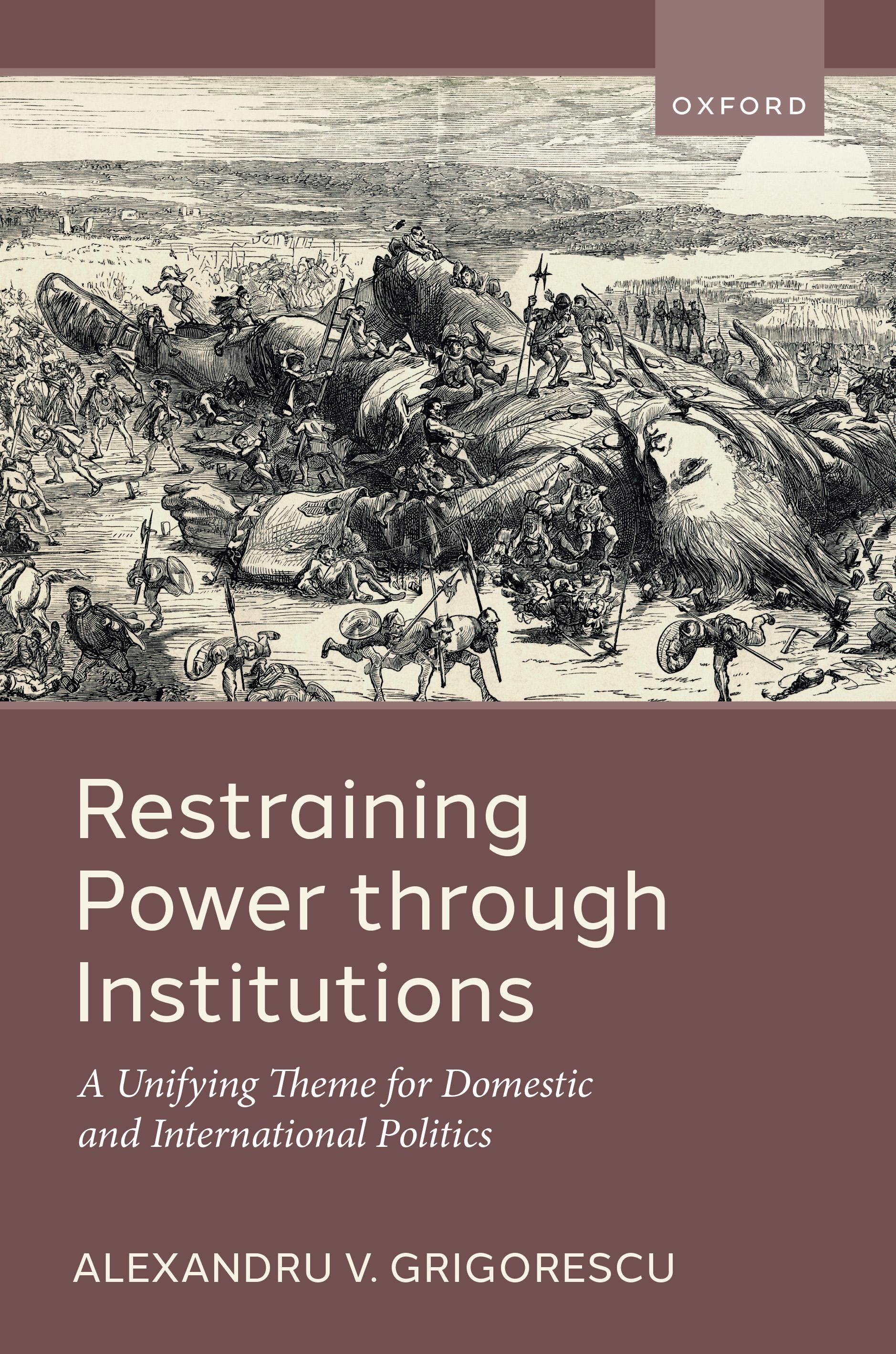Themainquestionandargumentdriving thisstudy
Theessenceofinternationalpoliticsisidenticalwithitsdomesticcounterpart.Bothinternationalanddomesticpoliticsareastruggleforpower […].
HansMorgenthau¹
Themostimportantfeatureofpoliticalorganizationisnotthatthestate hassupplantedallotherformsnorthatthedomainofthestatehas grownsolarge,butthatwayshavebeenfoundtocontrolitscoercive power.
ScottGordon²
Themainquestionandargument
Thelogicbehindtheabovequotations,takentogether,leadstothemainquestion drivingthepresentresearch.IbeginfromtheassumptionimplicitinMorgenthau’sstatementthatdomesticandinternationalpoliticshaveagreatdealin commonandthat,ifweconcentrateontheconceptofpower,wediscoverimportantparallelsinthetworealms.Thisargumentwasmadeevenmoreexplicita fewdecadesafterMorgenthauwrotethisstatement,inresponsetoscholarsquestioningwhetherinternationalrelations(IR)shouldbepartofthebroaderpolitical sciencediscipline.Forexample,WilliamFoxstatedin1968that“Putting‘power’ ratherthan‘thestate’atthecenterofpoliticalsciencemakesiteasiertoview internationalrelationsasoneofthepoliticalsciences.”³
Givensuchpotentialpower-basedlinkagesbetweendomesticandinternational politics,whatdoesGordon’sobservationaboutthecentralroleof restraints on poweratthestatelevelteachusabouttheinternationalrealm?Thisquestion,
¹ Morgenthau,HansJ.andKennethW.Thompson.1993. PoliticsamongNations:TheStrugglefor PowerandPeace.NewYork:McGraw-Hill,39–40.
² Gordon,Scott.1999. ControllingtheState:ConstitutionalismfromAncientAthenstoToday. Cambridge:HarvardUniversityPress,4.
³ Fox,WilliamThorntonRickert.1968. TheAmericanStudyofInternationalRelations.Essays. Columbia,SC:InstituteofInternationalStudies,UniversityofSouthCarolina.
RestrainingPowerthroughInstitutions.AlexandruV.Grigorescu,OxfordUniversityPress. ©AlexandruV.Grigorescu(2023).DOI:10.1093/oso/9780192863683.003.0001
rephrased,isthemainonedrivingthisstudy:havesimilarprocessesasthosethat ledtodomesticrestraintsonconcentratedpowerledtorestraintsonconcentrated powerininternationalrelations?⁴
Mymainargumentisanaffirmativeanswertothisquestion.Moreover,Isuggest,thatthedevelopmentof restraints onconcentratedpower,whichGordon considersthemostsignificantfeatureofpoliticalorganization,isasimportanta topicforIRastheoneofpursuit ofpoweremphasizedbyMorgenthauinhiswork. Afterall,theconstantpursuittoincreaseone’sownpowermaybeessentialforthe mostpowerfulactors(whetherindividuals,groupsofindividuals,orstates)who canaspiretouseittocontrolothersortochallengethosewhohavesuchaspirations.However,forthevastmajorityofindividualsandgroupsinastateorof countriesintheworld,acquiringmorepowertocompetewiththemostdominant actorsoftenappearsfutile,especiallyintheshortandmediumterm.Therefore, theywillbejustasinterested,ifnotmore,indevelopingrestraintsonthemost powerfulandreducingtheimpactoftremendousdiscrepanciesinthedistribution ofcapabilitiesasinincreasingtheirownpower.⁵
Whilerestraintsonconcentratedpowercantakeplaceoutsideformalinstitutions,especiallythroughtheubiquitous“balanceofpower,”atthedomesticlevel theyhavecometofunctionprimarilythroughformalgovernmentinstitutions. Thus,amorespecificversionofmymainargumentisthatfearofconcentrated powerisgeneratingsimilar institutional restraintsintheinternationalrealmasin thedomesticrealm.
AsIwillexplainingreaterdepth,institutionalrestraints,whetherdomesticor international,becometrulyrelevantwhentheyimpactthemostpowerfulactors orgroups,thosewhere,infact,powercomestobe concentrated. Thatisbecause weakeractorsarealreadyvirtuallyalwaysrestrainedbythemostpowerful,both withinandoutsideinstitutions.Thissuggeststhatthepresentbookfocusesnot onlyontheactionsandinterestsofthepowerful,butalsoonthoseofsecondrankedandweakgroupsofactors,thosewhoarelikelytobethegreatestsupporters ofinstitutionalrestraintson concentrated power.Afterall,theselargerbutweaker groupsarethemainpromotersofinstitutionalchecksonpower.
⁴ Whilemuchoftheexistingliteraturehastendedtofocusonconcentrated coercive power,Iwill takeabroaderview.Thatisbecause,asIshow,institutionalrestraintsonpower,themaintopicofthis book,arebasedonlongtermcalculations,wherethepotentialforalmostanytypeofpowertobecome coerciveleadsactorsandgroupstofearconcentratedpower,whetherapparentlycoerciveornot.
⁵ Thequestionofwhetherinstitutionalrestraintsonpowerare“good”isacomplexonethatrequires aseparatestudy,beyondthepresentonefocusingprimarilyoncomparisonsbetweendevelopments inthedomesticandinternationalrealms.Nevertheless,itisworthmentioningbrieflythatifsuch restraintsareunderstoodastoolsthatallowgroupstoavoidtheuseofviolentforce,theyshouldindeed beviewedasbeneficialtointernationalrelations(and,ofcourse,todomesticpolitics).Iacknowledge, however,thatthereareinstanceswhentherestraintscouldmakeitmoredifficultforpowerfulstates topromoteimportantglobalpolicies(suchasthoseinvolvinghumanrightsordealingwithclimate change).Yet,basedonpastexperienceinthedomesticrealm,andifwetakethecomparisonofinstitutionalrestraintsonpowerinthedomesticandinternationalrealmstoitsnaturalconclusion,overall, thebenefitsofdevelopingsuchinstitutionsintheinternationalrealmshouldoutweighthecosts.
Thus,myemphasisonpower restraints notonlycomplementsthevastIRliteratureon pursuit ofpowerasanessentialgoalofstates,butalsocomplements scholarshipthathastendedtoconcentrateprimarilyongreatpowerswithadditionalargumentsandfindingsrelatedtotheinterestsandactionsofmedium-sized andsmallstates.Thisshiftinfocusfromonesmallgroupofdominantactors tootherlargergroupsoflesspowerfulones,parallelsdevelopmentsincomparativepoliticswheretheliteratureondemocracyhaslongledtoequalinterests inpoliticalleaders,largergroupsofelitesandbureaucracies,andtheevenlarger “generalpublic.”WhileIamcertainlynotthefirsttoturnmyattentiontosmall andmedium-sizedstatesinseekingamorecompleteunderstandingofinternationalpolitics,amaincontributionofthepresentbooktoexistingscholarshipis thatitoffersimportantadditionalargumentsthatexplainwhythisshiftisessential forIR.
Comparingdomesticandinternationalpolitics
Perhapsthemostimportantcontributionofthisbookisthatitoffersanew approachtocomparingdomesticandinternationalpolitics.Pastliteraturehasgenerallycomparedthetworealmsby(1)consideringinteractionsbetweendomestic andinternationalactorswithinthesametimeframeand(2)drawingparallels betweentheinterestsandactionsofindividuals(indomesticpolitics)andofstates (intheinternationalrealm).Iexplainbelowhowtheseapproachesareflawed andsuggestthatthemostfruitfulanalogiesneedtotakeintoaccountdifferent timeframesandgroupsofactors(ratherthanindividualones).Inotherwords, anyparallelbetweentheevolutionofdomesticandinternationalinstitutional restraintshavetoconsider when suchrestraintsdevelopedinthetworealmsand who wasinvolvedintheirdevelopment.
Thetimeframesforthecomparison
Muchoftheliteraturedrawinganalogiesbetweendomesticandinternational realmshasmistakenlyfocusedonlyonthepresent(orrecent)statusquo.⁶ Iposit thatmanyoftheprocessesthatledtochecksonpowerthroughinternationalinstitutionsoverthepastcenturyortwoaresimilartothosethattookplacethrough domesticgovernmentinstitutionsstartingwiththeconsolidationofpowerin statessuchasEnglandandFranceasfarbackasonethousandyearsago.Implicitly,
⁶ Foracomprehensivediscussionofsuchdomestic–internationalanalogies,see Suganami,Hidemi. 2008. TheDomesticAnalogyandWorldOrderProposals.Cambridge:CambridgeUniversityPress.
wecanlearnmoreaboutchangesininternationalinstitutionsfromeventsprecedingandfollowingthesigningoftheMagnaCarta,theemergenceandevolutionof theCuriaRegisinEngland,oroftheEstatesGeneralandParlementsinFrance, thanfromhowgovernmentsareorganizedtoday.
Chapter 3 discussesingreatdetailsuchdomesticdevelopments.Itshowshow thefirstinstitutionalrestraintsonpoweremergedaboutonethousandyears agoandhavesincecontinuedtodevelop,mostoftenbecomingstrongerbut,at times,alsoweakening.Iwillextractfromthehistoricalnarrativefocusingonsuch earlydomesticinstitutionalrestraintssomeobservationsthatgenerateaseriesof expectationsfordevelopmentsintheinternationalrealm.
Throughoutthebook,butespeciallyintheconcludingchapter,Iwillalso offerseveralreasonswhythedynamicsbehindthedevelopmentofinstitutional restraintsmaydifferinthedomesticandinternationalrealms.Iwillespeciallynote howinstitutionalrestraintshavetakenmuchlongertodevelopintheinternational realm,comparedtothoseinthedomesticrealm.Someofthemoreimportant factorsleadingtosuchdifferencesare:travelandcommunicationarelikelyto bemoredifficultwhenestablishinginstitutionsthatbringtogetherstaterepresentatives,ratherthanlocalandsubnationalones;thebenefitsfromdomestic collaborationareoftenmoreeasilyrecognizablecomparedtothosethatderive frominternationalcollaboration;theshiftsinrelativepoweramongdomestic groupsusuallytakeplacefaster,comparedtothosebetweenstatesand,consequently,asIwillshow,therearemoreinstanceswhenthereissufficientsupport forinstitutionalrestraintswithinstatesratherthanamongthem;theexistence offoreignfoesfordomesticsystems(butnotforinternationalones)alsocontributestothemanyopportunitiestoempowerexistinginstitutionalrestraints; officialsfromdomesticinstitutionsaremorelikelytodevelopstrongerallegiances tonationalinstitutionscomparedtotheweakerallegiancesofficialsfromintergovernmentalorganizations(IGOs)tendtodevelop,leadingtofasterconsolidation ofinstitutionalrestraintsintheformercomparedtothelatter.Iwillexpandon theseargumentsintheconcludingchapter.
Theargumentthatinstitutionalrestraintsonconcentratedpowercamemuch laterintheinternationalrealm,comparedtothoseinthedomesticrealm, suggeststhatthecurrentinternationalinstitutionalrestraintsarestillrelativelyweak,similartotheveryearlyonesthatfunctionedthroughdomesticinstitutionsduringtheMiddleAgesandthatsimplymadeit moredifficult forrulerstotakeanyactionstheypleasedbutcouldnotoutright stop them.However,Iarguethatevensuchfairlyweakinstitutionalrestraintswere veryimportantfordomesticpoliticsathousandyearsagoandforrecent internationalpoliticsofthepastcenturyortwo.Additionally,currentinternationalinstitutionalrestraintshaveevolvedsubstantiallyoverthepastcenturyand,insomeinstances,representasignificantfeatureofinternational relations.
Forexample,the1907PorterConvention,consideredthefirstmultilateral treatytosetlegallimitsontheuseofforce,onlyprohibitedtheuseofarmed forcewhengovernmentdebtwasowedtoprivateparties.Themuch-debatedconventionwasprimarilyintendedtorestricttheactionsofpowerfulstates,theonly internationalactorswhohadthenecessaryresourcestouseforceinrecovering debts.Today,internationallawandinternationalcourtshavesetmanymorelimitsonpowerfulstates’actions,whetherintherealmofmilitaryintervention,trade, disarmament,orrefugees.
Similarly,assembliesininternationalinstitutions(suchastheUNGeneral Assembly)arestillweak,especiallywhencomparedtonationallegislativebodies.Theyusuallyhaveconsultativeroles,ratherthanlegislativeones.However, theyallowallstates,eventhesmallest,theopportunitytovoicetheirconcerns andsometimescan“shame”greatpowersintoalteringtheirpolicies.Forexample, a1997UNGeneralAssemblyresolutionthatsingledoutRussiaandtheUnited StatesfornotratifyingtheChemicalWeaponsConvention(althoughtheywere theonlytwodeclaredpossessorsofsuchweapons)isgenerallyviewedastriggering severalmonthslaterratificationsoftheconventionbybothgreatpowers.⁷
ThiscontrastswiththeConcertofEurope,oftenconsideredthefirstmajormultilateralinstitution,thatwascomposedonlyofthefivemostpowerfulstatesand rarelyinvited some smallstatestotakepartin some deliberations.Onthefew occasionswhensmallstatescomplainedabouttheexclusivecharacteroftheConcert(astheKingofWu¨rttembergdidin1823),greatpowersscornedtheirideas publiclyandeventhreatenedthosewhoraisedthisissue.⁸
Anotherexampleofchangeininternationalrestraintsonconcentratedpower referstotheevolutionofinternationalsecretariats.IntheCentralCommission fortheNavigationoftheRhine,establishedin1815,andgenerallyconsideredthe firstIGO,individualstaffmemberswereintendedtorepresenttheirrespective member-stategovernments,nottheorganizationitself.Whenthe“commissioners”inthisorganizationslowlymovedtogaingreaterautonomyinthefirsthalf ofthenineteenthcentury,theirgovernments(ledbythemostpowerfulmember oftheorganization,Prussia)adoptedin1868theTreatyofMannheimtoreverse thisshift.⁹ SecretariatsofmostotherIGOsofthenineteenthcenturyalsohad verylittleautonomyfromstates.Aslateas1920,someIGOstaffevenintechnical organizations,suchasthosethatdealtwithhealth,oftenconsideredthemselves
⁷ SeeA/RES/51/45(sectionT)availableat https://undocs.org/en/A/RES/51/45.
⁸ Klein,RobertA.1974.SovereignEqualityamongStates:TheHistoryofanIdea.Toronto:University ofTorontoPress,35–6.
⁹ Doerflinger,Robert.1987.“LaCommissionCentralepourlanavigationduRhin:170ans d’évolutiondustatutinternationalduRhin,”Strasbourg:CentralCommissionfortheNavigationoftheRhine, http://www.ccr-zkr.org/files/histoireCCNR/07_ccnr-170-ans-evolution-statutinternational-du-rhin.pdf.
torepresenttheirgovernmentsratherthantheIGOs.¹⁰ However,throughoutthe 1920s,thenotionofIGOstaffautonomywasembracedbyvirtuallyallstates, includingpowerfulones.
OverthepastfewdecadessuchsecretariatshaveusedtheirautonomytocriticizestatesandevenmakepublicembarrassinginformationaboutIGOmembers, includinggreatpowers.Insomeinstances,IGOsecretariatsrevealedinformation thatledgreatpowerstoaltertheirintendedactions.Awell-knownexampleisthat ofInternationalAtomicEnergyAgencyofficialswhoinformedtheUSSRthatthey wereobligatedtomakepublictheirfindingsaboutthe1986Chernobylnuclear accidentifthegovernmentdidnotacknowledgefirstthemagnitudeofthedisaster. Similarly,in2004,theactingUNHighCommissionerforHumanRights(representingtheIGO,notgovernments)submittedablisteringreportonUShuman rightsabusesinIraqafterthe2003invasionofthatcountry,includingtheinfamousactionsattheAbuGhraibprison.Inbothcases,actionsoftheautonomous IGOsecretariatsledpowerfulstatestoaltertheirpolicies.
Thisevolutionaryview,ofincreasinglypowerfulinternationalinstitutional restraintsacrosstime,doesnotimplyateleologicalunderstandingofglobalgovernanceinchingclosertoaninevitablestate-likestructure.¹¹ Indeed,Iwillshow that,althoughoverthepasttwocenturies,internationalinstitutionalrestraintson concentratedpowerhave generally becomestronger,theyhavealsoexperienced erosionsaspartofbroaderback-and-forthshifts.Thepresentstudyseekstoidentifythefactorsthatleadbothtotheempowerment and erosionofinstitutional restraints.Tothisend,thecomparisonwiththelong-termevolutionofdomestic institutionalrestraintsisparticularlyuseful.Asdomesticinstitutionswerecreatedmuchearlierthaninternationalones,therestraintsbuiltinsuchinstitutions haveexperiencedmanychanges,oftenassociatedwiththe“waves”and“counterwaves”ofdemocracy.¹² Byunderstandinghowdomesticinstitutionalrestraints havebecomeweakerandnotjuststronger,wecanassessbetterthelikelyevolution ofinternationalrestraints.
AlthoughIdonotembracetheviewthattherehasbeena continuous empowermentofinternationalinstitutionalrestraints,Ialsoquestionwhetherthenature ofIRisasimmutableasrealistssuchasMorgenthauandGilpinsuggested.¹³ Afterall,ittookdomesticinstitutionsaboutathousandyearstoevolvefrom theWitan(anearlyconsultativeassemblytoAnglo-Saxonkings)andtheMagna
¹⁰ See,e.g., Borowy,Iris.2009. ComingtoTermswithWorldHealth:TheLeagueofNationsHealth Organisation1921–1946.FrankfurtamMain:PeterLang,62.
¹¹ Foradiscussionofthe“inevitability”ofaglobalgovernmentargumentsee,e.g.,Wendt,Alexander. 2003.“WhyaWorldStateIsInevitable,” EuropeanJournalofInternationalRelations 9(4):491–542.
¹² Huntington,SamuelP.1993. TheThirdWave:DemocratizationintheLateTwentiethCentury. Norman,OK:UniversityofOklahoma.
¹³ Morgenthau,HansJ.andKennethW.Thompson.1993. PoliticsamongNations:TheStrugglefor PowerandPeace.NewYork:McGraw-Hill; Gilpin,Robert.1981. WarandChangeinWorldPolitics Cambridge:CambridgeUniversityPress,7.
Cartatothepowerfulcurrentrestraintsinmorethanonehundreddemocratic orquasi-democraticnationalsystems,achangedescribedintheabovequotation fromGordonasthe“mostimportantpoliticalfeatureofpoliticalorganization.” Thisevolutionwasnotlinearandexperiencedevenrecentlyseveralback-andforthshifts.Thepresentbookwillshowthatinternationalinstitutionalrestraints onpowerhavealsodevelopedincrementallyacrosstimeand,inmostcases, becamestronger,evenifinsomeinstancestheybecameweaker.Thesechanges arecomparabletothosethattookplaceindomesticinstitutionsstartingabout onethousandyearsago.
Specifically,Iwillshowthattheinternationalinstitutionalrestraintsonpower throughIGOassembliesarecurrentlyatastageofdevelopmentsimilartotheone experiencedbytheearlyconsultativeandlegislativeassembliesthatemergedand developedincountriessuchasEnglandandFrancefromabouttheninthtothe thirteenthcenturies.Inbothinstances,suchassembliescanraiseconcernsabout themostpowerfulactorsandgroupsofactorsandmakeitmoredifficultforsome actionstobetaken(especiallyforfinancialorlegitimacy-relatedreasons)butcannotoutrightstopthem.Iwillalsoshowthatinternationallawandinternational courtsarecurrentlyexperiencingdynamicssimilartotheonesexperiencedby EnglishandFrenchlawsandcourtsfromaroundthetwelfthtothesixteenthcenturieswhenjudgeswerebecomingincreasinglyautonomousbutcouldstillnot adoptdecisionsagainstrulers’majorinterests,atmostagainstalliesoftherulers andagainstsomeoftherulers’secondaryinterests.Moreover,developmentsover thepasthalfcenturyinvolvingtheEuropeanParliamentandEuropeanCourtof Justice,parallelthosethatunfoldedatthestatelevelmorerecently,inthefirstwave ofdemocratizationfromtheearlynineteenthtotheearlytwentiethcenturies.¹⁴ Whiletheinternationalrelationsliteraturehassometimesturneditsattention todevelopmentsfromtheMiddleAges,mostsuchworkhasemphasizedhowpoliticsinthosetimes differed fromthoseweexperiencetoday.¹⁵ Mostimportant,the dynamicsinvolvingearlydomesticinstitutionshasnotbeencomparedtorecent
¹⁴ Itisimportanttoacknowledgeearlyoninthisstudythehighlevelofgeneralityofmyclaims. Indeed,asinvirtuallyallinstanceswheretheliteratureappliesargumentsacrosslevelsofaggregation (but,sometimesevenwithinthesamelevel)predictivepowerisrelativelyweak.AsIwillshow,this doesnotimply,however,thattheprocessestakingplaceinthedomesticandinternationalrealmsare nottrulycomparableandthatfearofconcentratedpowerdoesnotaffectdevelopmentsinthetwo realmsinasimilarway.ToparaphraseKennethWaltz,althoughthelawofgravitationcannotpredict the“waywardpathofafallingleaf,”itisausefullawthatneverthelessallowsustounderstandthat theleafwilleventuallyfall. Waltz,KennethN.1979. TheoryofInternationalPolitics.Reading,Mass: Addison-WesleyPub.Co.,121.
¹⁵ Amongthemanyworksthatarerelevanthere,see,e.g., Ruggie,JohnGerard.1993.“TerritorialityandBeyond:ProblematizingModernityinInternationalRelations,” InternationalOrganization 47(1):139–74; Hall,RodneyBruceandFriedrichV.Kratochwil.1993.“MedievalTales:Neorealist ‘Science’andtheAbuseofHistory,” InternationalOrganization 47(3):479–91; Friedrichs,Jo¨rg.2001. “TheMeaningofNewMedievalism,”EuropeanJournalofInternationalRelations7(4):475–501;Costa Lopez,Julia.2020.“PoliticalAuthorityinInternationalRelations:RevisitingtheMedievalDebate,” InternationalOrganization 74(2):222–52.
onesinvolvinginternationalinstitutions. Interestingly,therearestillrelativelyfew worksoncurrentinstitutionalrestraintsonpowerinthedomesticrealmthatseek inspirationinearlyinstitutionsfromtheMiddleAges.¹⁶
Thepresentstudywillalsoshowthattwootherdevelopmentsthatresultedfrom effortstoavoidtheconcentrationofpowerindomesticinstitutionshave,infact, beencomparedtosimilaronesintheinternationalrealm:thepushtoestablish acivilservicethatisautonomousoftheexecutivebranchofgovernment,startingaroundthenineteenthcentury,andlatereffortstocontrolthepowerofsuch bureaucracies.Thiswaspossiblebecausesomeofthesedevelopmentsinthetwo realmswerefairlyclosetoeachotherintimeandthereforemoreeasilyobservable.Infact,intheearly2000s,wheninternationalinstitutionsdevelopedpolicies requiringstafftosharewiththepublicimportantinformation(viewedbymanyas awayofrestrainingtheinfluenceofincreasinglypowerfulgovernmentbureaucracies),individualswhohadbeeninstrumentalinpassingfreedomofinformation legislationwithintheirstatesjustafewdecadesorevenyearsearlier,werecalled tohelpdraftIGOpolicies.¹⁷ However,inmostothercasesthedevelopmentsin domesticandinternationalinstitutionsthatIdiscusstookplacemanycenturies apart,makingitdifficulttonoticeandassesssimilaritiesinsuchprocesses.
Comparinggroupsofactorsratherthanactors
Thevastmajorityofexistingliteraturecomparingdomesticandinternationalpoliticshasfocusedonanalogiesbetweeninterestsandactionsofindividualswithin thestateandthoseofindividualstatesintheinternationalsystem.Iseektomove beyondsuchsimplifyingandoftenflawedparallelsthathavepermeatedtheIRliteratureforalongtimebyfocusingongroupsofactorsinthetworealmsandon theiraggregatepower.Indeed,atthedomesticlevel,thisapproachtothestudyof politicshasbeenacceptedforsometimeandmaybebestsummarizedinthewords ofHannahArendt:“powerisneverthepropertyofanindividual;itbelongstoa groupandremainsinexistenceonlysolongasthegroupkeepstogether.”¹⁸ Even absolutemonarchsanddictatorsshouldbeunderstoodasleadersofsmallgroups ofindividualswithinstateswhohavestronginterestsinmaintainingthestatus quo.Similarly,intheinternationalrealm,evenwhenpowerisconcentratedinthe
¹⁶ Iwilldiscusssomeimportantexceptions,suchas North,DouglassC.andBarryR.Weingast. 1989.“ConstitutionsandCommitment:TheEvolutionofInstitutionsGoverningPublicChoicein Seventeenth-CenturyEngland,”TheJournalofEconomicHistory 49(4):803–32;Olson,Mancur.1993. “Dictatorship,Democracy,andDevelopment,” TheAmericanPoliticalScienceReview 87(3):567–76; Weingast,BarryR.1997.“ThePoliticalFoundationsofDemocracyandtheRuleofLaw,”TheAmerican PoliticalScienceReview 91(2):245–63.
¹⁷ E.g., Grigorescu,Alexandru.2003.“InternationalOrganizationsandGovernmentTransparency: LinkingtheInternationalandDomesticRealms,” InternationalStudiesQuarterly 47(4):643–67.
¹⁸ Arendt,Hannah.2014. OnViolence.Cheshire:StellarClassics,143.
handsofonestate(sometimesreferredtoasthe“hegemon”),thepoweris,infact, heldbyagroupofindividualswithinthatstate.Moreover,throughouthistory, mostimportantinternationaldevelopmentsunfoldedwhengroupsofstatesacted together.Ifweconsiderthepowerthatneedstoberestrainedastheaggregateof multipleactors,thatis,ofgroupsofactors,whetherthatmeansgroupsofindividualswithinstatesorgroupsofstateswiththeinternationalsystem,ourarguments andfindingsaremorelikelyto“travel”acrossdifferenttypesofstates,acrosstime, and,essentialforthisstudy,acrossthedomestic–internationaldivide.
Iwillidentifythemostimportantgroupsthatcontributedtotheemergence, empowerment,anderosionofinstitutionalrestraintsonconcentratedpower inthedomesticandinternationalrealms.Ialsodevelopasetofexpectations regardingsuchgroups’variedrolesintheevolutionofinternationalinstitutional restraintsonpower.
Thisstudywillthenassesstheplausibilityofmymainargument,thatthe processesleadingtotheemergenceandevolutionofinstitutionalrestraintson concentratedpowerinthedomesticandinternationalrealmshavebeensimilar. Therestofthisfirstchapterbeginsbyplacingmyquestionandargumentwithin thebroaderliteraturediscussingdifferencesandsimilaritiesbetweendomestic andinternationalpolitics.Ishowhowmyapproachtakessomeelementsfrom thisliteratureandcomplementsitwithadditionalones.
Placingthemainquestionandargumentinthebroaderliterature
Thequestionofwhethertheprocessesleadingtodomesticinstitutionalrestraints onconcentratedpowerledtosimilarinternationalinstitutionalrestraints,of course,canbeframedwithinthebroaderliteraturethatcomparesdomesticand internationalpolitics.Theperceivedusefulnessofsuchcomparisonshasfluctuatedbothacrosstimeandacrossissues.Theideathatinternationalrelations shouldbeorganizedfollowingdomesticmodelsbeganbeingpromotedthroughoutthenineteenthcentury,inthewritingsofahandfulofindividualssuchas Saint-Simon,Ladd,Lorimer,andBluntschli,butitwasnevertrulyappliedto real-worlddevelopments.Thedomestic–internationalanalogywasmuchmore broadlyacceptedwhenthefirstmajorinternationalinstitutionssuchastheLeague ofNations¹⁹ wereestablishedintheaftermathofWorldWarI.However,after WorldWarII,theliteraturebeganemphasizingthedifferencesbetweendomesticandinternationalpolitics,leadingsometheoristssuchasCharlesManning, FrederickDunn,andStanleyHoffmantoadvocatefortheestablishmentofIR asadifferentfieldfromPoliticalScience.In1959,Hoffmanwrote:“International
¹⁹ E.g., Zimmern,Alfred.1939. TheLeagueofNationsandtheRuleofLaw1918–1935.London: Macmillan,chapter 7.
Relationstakeplaceinamilieuwhichhasitsown‘coherenceanduniqueness,’its rulesofthegamewhichdiffersharplyfromtherulesofdomesticpolitics,itsown perspective.”²⁰
Itissomewhatsurprisingtoseesuchanemphasisonthedifferencesbetween domesticandinternationalpolitics,especiallyafterHansMorgenthau,whohad astronginfluenceonvirtuallyalltheaforementionedscholars,hadargued(as notedintheopeningquoteofthisstudy)thatthetworealmsindeedsharedacommonlogic,onebasedonactors’pursuitofpower.However,whenclassicalrealists, includingMorgenthau,lookedtodomesticanalogiestheyrightfullydismissedany contemporarydevelopments,buttheyalsodidnotseekcomparisonstoearlyones, frommanycenturiesago,asthepresentstudydoes.Instead,theyfeltIRcould bestlearnfrominteractionsamongindividualswithincommunitiesvaguelyconceptualizedasonesofaHobbesianstateofnature.Ifmoredetailedcomparisons weresought,theliteraturefocusedon“primitive”societies,²¹inotherwordsonthe periodthatprecededthoseofstateformationandconsolidationemphasizedin thisbook.Itisthroughsuchpower-basedarguments²²(butalsothroughothers²³) thatIRwasbroughtclosertomainstreampoliticalscienceinthe1960s.
ThroughoutthelaterpartoftheColdWar,thedifferencesbetweendomestic andinternationalpoliticswereemphasizedoncemore,especiallyafterKenneth Waltz’s“neorealist”approachhighlightedthedichotomousdistinctionbetween domesticsystemsseenashierarchicinnatureandtheinternationalsystemunderstoodasanarchic.²⁴ Additionally,neorealismembracedevenmorethanclassical realismtwootherimportantassumptionsthatmadeanydomestic–international comparisonsdifficulttosustain:thatinIRstatesareunitaryactorsandthatthey aretheonlyrelevantactors.²⁵
SomechallengedtheseassumptionswellbeforetheendoftheColdWar.²⁶However,especiallywiththeemergenceofconstructivismandnewliberalisminthe
²⁰ Hoffmann,Stanley.1959.“InternationalRelations:TheLongRoadtoTheory,” WorldPolitics 3(11):346–77,347.
²¹ E.g.,Masters,RogerD.,1964.“WorldPoliticsasaPrimitivePoliticalSystem,”WorldPolitics16(4): 595–619.
²² E.g.,Fox,WilliamThorntonRickert.1968.TheAmericanStudyofInternationalRelations.Essays Columbia,SC:InstituteofInternationalStudies,UniversityofSouthCarolina.
²³ See,e.g., Spiro,Herbert.1966. WorldPolitics:TheGlobalSystem.HomewoodIL:DorseyPress; Rosenau,James.1966. CalculatedControlasaUnifyingConceptintheStudyofInternationalPolitics andForeignPolicy.Princeton:CenterforInternationalStudiesPrincetonUniversity.
²⁴ Waltz,KennethN.1979. TheoryofInternationalPolitics.Reading,Mass:Addison-WesleyPub. Co.
²⁵ See,e.g., Milner,HelenV.1998.“RationalizingPolitics:TheEmergingSynthesisofInternational, American,andComparativePolitics,” InternationalOrganization 52(4):759–86; Staton,JeffreyK.and WillH.Moore.2011.“JudicialPowerinDomesticandInternationalPolitics,” InternationalOrganization 65(3):553–87. Hafner-Burton,EmilieM.,DavidG.Victor,andYonatanLupu.2012.“Political ScienceResearchonInternationalLaw:TheStateoftheField,” AmericanJournalofInternationalLaw 106(1):47–97.
²⁶ E.g., Allison,GrahamT.1969.“ConceptualModelsandtheCubanMissileCrisis,” TheAmerican PoliticalScienceReview63(3):689–718;Ruggie,John.1982.“ContinuityandTransformationinWorld Politics:TowardaNeorealistSynthesis,”WorldPolitics35:261–85;Ashley,Richard.1984.“ThePoverty
1990s,IRtheoryincreasinglyquestionedthatstatesarealwaysthemostimportantactors²⁷ andthattheyareunitaryactors.²⁸ Mostimportant,theychallenged theargumentthattheinternationalsystemistrulyanarchic.²⁹
HelenMilnersuggestedasearlyas1991thatdomesticpoliticsisoftennotvery hierarchicalinnaturebecauseinmoststates,authorityisnotconcentratedbut, rather,diffused.Conversely,duetotheexistenceofinternationalgoverninginstitutionsandtoabodyofinternationallaws,internationalpoliticsisnotcompletely anarchic.Thequestionforherratherreferredto thedegree towhichinternational institutionscommandobedience.ThisargumentledMilnertoanobservationthat isessentialforthepresentstudy:thatanarchyandhierarchy(thatimpliesconcentrationofauthority)isbestunderstoodasfallingatdifferenttimesandindifferent systemsacrossacontinuum,ratherthanrepresentingtwocompletelyopposed concepts.³⁰
AlexanderWendtaddedtothisargumenttheonethat,evenifthesystemwas trulyanarchic,statesdidnotnecessarilyneedtoactaspotentialenemiestowards eachother.³¹ Helaterexpandedsuggestingthatstatebehaviordependedonthe “cultureofanarchy”prevalentintheinternationalsystem,distinguishingbetween threesuchculturesthat,asinthecaseofMilner’sargument,alsoimpliedtheexistenceofacontinuum:theHobbesian(realist)variantofanarchy(wherestates wouldindeedseeothersasenemies),theLockeanone(wheretheywouldbe rivals),andtheKantianone(wheretheywouldbefriends).³²
By1998,Milnerarguedthatoverthepreviousdecade“thedegreeofdivergence betweenIRandtherestofthepoliticalscience[…]seemstohavelessened,”and thatthepotential“cross-fertilization”betweenthesubfieldswasduetotherelativelyrecentrelaxationofthebasicassumptionsofneorealism.³³Overthepasttwo decades,theIRliteraturehasindeedpaidmuchmoreattentiontothehierarchic ofNeorealism,” InternationalOrganization 38(2):225–86; Putnam,Robert.1988.“Diplomacyand DomesticPolitics:TheLogicofTwo-LevelGames,” InternationalOrganization 42(3):427–60.
²⁷ E.g., Keck,MargaretE.andKathrynSikkink.1998. ActivistsbeyondBorders:AdvocacyNetworks inInternationalPolitics.Ithaca,NY:CornellUniversityPress.
²⁸ E.g., Moravcsik,Andrew.1997.“TakingPreferencesSeriously:ALiberalTheoryofInternational Politics,” InternationalOrganization 51(4):513–53.
²⁹ See,e.g., Staton,JeffreyK.andWillH.Moore.2011.“JudicialPowerinDomesticandInternationalPolitics,” InternationalOrganization 65(3):553–87; Milner,Helen.1991.“TheAssumptionof AnarchyinInternationalRelationsTheory:ACritique,” ReviewofInternationalStudies 17(1):67–85. Lake,David.A.2010.“RightfulRules:Authority,Order,andtheFoundationsofGlobalGovernance,” InternationalStudiesQuarterly 54(3):587–613.
³⁰ Milner,Helen.1991.“TheAssumptionofAnarchyinInternationalRelationsTheory:ACritique,” ReviewofInternationalStudies 17(1):74–6.
³¹ AlexanderWendt.Spring,1992,“AnarchyiswhatStatesmakeofit:TheSocialConstructionof PowerPolitics,” InternationalOrganization 46(2):391–425.
³² Wendt,Alexander.1999. SocialTheoryofInternationalPolitics.Cambridge:CambridgeUniversityPress.
³³ Milner,HelenV.1998.“RationalizingPolitics:TheEmergingSynthesisofInternational,American,andComparativePolitics,” InternationalOrganization 52(4):759–86,760.
structuresinglobalgovernance³⁴ and,consequently,haslaidthegroundworkfor morerefinedcomparisonsbetweenthedomesticandinternationalrealms.
Despitethisgreaterwillingnesstoseeksimilaritiesbetweendomesticand internationalpolitics,themainstreamIRliteraturehasneverthelesscontinued toemphasizedifferencesbetweenthetworealms.Inpart,thistrendhasbeen spurredbythefactthatitisindeedtruethattherearemanyimportantdifferencesbetween current domesticandinternationalinstitutions.³⁵ Additionally,for centuries,potential(andsuperficial)similaritiesbetweenthedomesticandinternationalrealmshavegeneratednumerousidealisticproposalsthat,inturn,ledto astigmaagainstanalogiescrossingthenational–internationaldivide.
Thereappeartobedifferencesbetweenthevarioussubfieldsofinternational relationsregardingtheperceivedusefulnessofdomestic–internationalcomparisons.Forexample,thestudyofinter-stateconflictreliesheavilyontheanarchic natureofIRanddoesnotfindmuchusefordomesticanalogies.Similarly,internationallawscholarshipstartsfromthepremisethatthelackofaglobalgovernment doesnotallowfortheenforcementofinternationalagreementsinthesameway thatdomesticlawsareenforced.³⁶ Evenwhensuchscholarshipidentifiedpossiblewaysinwhichthestudyoftheinternationalrealmcanbenefitfromour understandingofdomesticdevelopments(asinthecaseoftheliteratureonglobal constitutionalism³⁷ortheoneonadministrativelaw³⁸)itsconclusionshavetended tobemorenormative,speakingtothepotentialchangestointernationalinstitutionsandlawinordertomakethemmoresimilarto current domesticinstitutions andlaw,ratherthanexplanatory,accountingfortheevolutionofinternationallaw inthepast.
Incontrast,thescholarshiponinternationalinstitutions,hastendedtoacknowledge,morethantheotherbodiesofIRliterature,thesimilaritiesbetweenthetwo realms.³⁹ Indeed,howcoulditnotdoso?Afterall,withinIGOsindividualsrepresentinglarge(usuallynational)groupsgatherininternationallegislative-type
³⁴ See,e.g., Cooley,Alexander.2005. LogicsofHierarchy:TheOrganizationofEmpires,Statesand MilitaryOccupations.Ithaca,NY:CornellUniversityPress; Donnelly,Jack.2006.“SovereignInequalitiesandHierarchyinAnarchy:AmericanPowerandInternationalSociety,” EuropeanJournalof InternationalRelations 12(2):139–70; Ikenberry,John.2011. LiberalLeviathan:TheOrigins,Crisis, andTransformationoftheAmericanWorldOrder.Princeton,NJ:PrincetonUniversityPress; Lake, David.2009. HierarchyinInternationalRelations.Ithaca,NY:CornellUniversityPress; Ward,Kerry. 2009. NetworksofEmpire.NewYork:CambridgeUniversityPress; Weber,K.2000. Hierarchyamidst Anarchy.Albany:StateUniversityofNewYork.
³⁵ Althoughthepresentstudyfocusesprimarilyonsimilaritiesbetweendevelopmentsinthetwo realms,intheempiricalchaptersandconclusionsitwillalsopointoutimportantdifferences.
³⁶ E.g., Hurd,Ian.2015.“TheInternationalRuleofLawandtheDomesticAnalogy,” Global Constitutionalism 4(3):365–95.
³⁷ Foranexcellentcomprehensivesurveyoftheliterature,see Lang,AnthonyF.andAntjeWiener. 2017. HandbookonGlobalConstitutionalism.CheltenhamUK:EdwardElgarPublishers.
³⁸ See,e.g., Kingsbury,Benedict,NicoKrisch,andRichardB.Stewart.2005.“TheEmergenceof GlobalAdministrativeLaw,” LawandContemporaryProblems 68:15–62.
³⁹ Milner,HelenV.1998.“RationalizingPolitics:TheEmergingSynthesisofInternational,American,andComparativePolitics,” InternationalOrganization 52(4):759–86,760.
forumsandvoteonimportantquestionssuchasthoserelatedtohealth,labor, andeconomicpolicies,justasdomesticlegislatorsgatherandvoteonsuchissues inparliamentarybodies.ManyofthesevotesleadtorulesthatIGOsthenapply intheirglobalgovernanceeffortsjustaslegislaturesadoptdomesticlawsthat governmentsthenimplement.
Withafewrelevantexceptions,decisionswithinIGOsareadoptedthrough simplemajorityvoting.Two-thirdsmajorityvotesareusuallyrequiredforthe moreimportantmatters,justasinmanynationalparliamentsacrosstheworld. Moreover,internationalinstitutionsgenerallyestablishtwodifferentbodiesthat needtomutuallyaccepteachother’sdecisionsandthatreflectstrikingsimilarities withtheworkingsofbicamerallegislatures.Forexample,numerousdecisionsin theUN,fromtheacceptanceofnewmemberstotheselectionoftheSecretaryGeneral,needtobeapprovedbothbytheSecurityCouncilandbytheGeneral Assembly.OverthepastcenturyalmostfortyIGOshavecreatedparliamentary assemblies.⁴⁰ Manyofthemadoptedrulesofprocedurethatareverysimilarto thosefromnationalparliaments.
Dozensofinternationalcourtshavealsoemergedtoarbitrateandadjudicate internationalcasesinsimilarwaysasdomesticcourtsdealwithcasesbetween individualsandinstitutionsatthenationallevel.⁴¹ Insuchinternationaland domesticcourts,judges,prosecutors,andregistrarshavesimilarroles.Thesimilaritiesappeartohavebecomeevenmorenoticeablewiththeemergenceof internationalcourtssuchastheonesfortheformerYugoslavia,forRwanda,and theInternationalCriminalCourtthatfocusoncrimescommittedbyindividuals ratherthaninter-statedisputes.Theindependenceofthejudgesinsuchcourtsis increasinglyemphasized,justaswithjudgesfromdomesticcourts.⁴²
Theparallelsbetweeninternationalinstitutionsanddomesticoneshavebeen spurredoverthepasttwodecadesbytheemergenceofamultitudeofIGOoffices thatareintendedtoprovideagreaterdegreeofoversightoverIGOstaff.Inspection,evaluation,investigation,andethicsofficesweregenerallycreatedinIGOs startinginthelate1980sandmimicinstitutionsthatholdofficialsaccountable innationalgovernmentstructures.⁴³ Domesticmodelsappeartohavebeenused forthefairlyrecentestablishmentofrulesandofficesthatencouragecivilsociety
⁴⁰ Grigorescu,Alexandru.2015.DemocraticIntergovernmentalOrganizations?NormativePressures andDecision-MakingRules.NewYork:CambridgeUniversityPress,248–49.
⁴¹ Romano,CesareP.R.1999.“TheProliferationofInternationalJudicialBodies:ThePiecesofthe Puzzle,” N.Y.U.JournalofInternationalLawandPolitics 31(4):709–52.
⁴² E.g., Zimmermann,Dominik.2014. TheIndependenceofInternationalCourts:TheAdherence oftheInternationalJudiciarytoaFundamentalValueoftheAdministrationofJustice.Baden-Baden: Nomos.
⁴³ E.g., Park,Susan.2010. WorldBankGroupInteractionswithEnvironmentalistsChangingInternationalOrganisationIdentities.Manchester:ManchesterUniversityPress; Grigorescu,Alexandru. 2010.“TheSpreadofBureaucraticOversightMechanismsacrossIntergovernmentalOrganizations,” InternationalStudiesQuarterly 54(3):871–86.
organizationstoworkmorecloselywithIGOsandforthosethatplaceobligations onIGOstoshareinformationwiththepublic.
Additionally,IGOshavecreatedinstitutionsthatguardtheautonomyoftheir staff.ThevastmajorityofIGOstaffhasformedunions,mirroringdevelopments indomesticgovernmentinstitutions.Recently,IGOsalsoadoptedwhistleblower protectionpolicieslikethoseindomesticgovernmentinstitutions.
Thestudyofinternationalinstitutionsalsoappearstohaveembracedmorethan otherIRsubfieldstheoreticalapproachesthathavebeenpreviouslyappliedto domesticpolitics.TheworkonIGOshasthusborrowedfromallthreeformsof institutionalismdevelopedtoexplaindomesticinstitutions:rationalchoice,sociological,andhistorical.⁴⁴ Recently,theliteratureonIGOshasappliedprincipalagentapproachesthatoriginatedinthestudyofthedomesticrealmandhasbeen particularlysuccessfulinexplainingactionsofbureaucracies.⁴⁵Thepublicadministrationliteraturehasalsosoughttoapplydomesticapproachesforthestudy ofbureaucraciestoIGOs.⁴⁶ Thefactthatmanyoftheexplicitparallelsbetween theuseofsuchtheoreticalapproachesinthedomesticandinternationalrealms arerecent,shouldnotobfuscatethefactthatthestudyofinternationalinstitutionshassoughtinspirationintheoreticalapproachesfromcomparativepolitics fordecades.⁴⁷ However,allsuchanalyseshavebeenusedsimplytoexplaininternationaldevelopmentsandonlyrarelytoaccountforthesurprisingsimilarities
⁴⁴ Forexamplesofrationalchoiceinstitutionalismsee,e.g.,Abbott,KennethW.andDuncanSnidal. 1998.“WhyStatesActthroughFormalInternationalOrganizations,” TheJournalofConflictResolution:AQuarterlyforResearchRelatedtoWarandPeace 42(1):3–32; Koremenos,Barbara,Charles Lipson,andDuncanSnidal.2004. TheRationalDesignofInternationalInstitutions.Cambridge:CambridgeUniversityPress;Importantexamplesofsociologicalinstitutionalismare Finnemore,Martha. 1996. NationalInterestsinInternationalSociety.Ithaca,NY:CornellUniversityPress; Finnemore, MarthaandKathrynSikkink.1998.“InternationalNormDynamicsandPoliticalChange,” InternationalOrganization 52(4):887–917.Recentrelevantexamplesofhistoricalinstitutionalismare Fioretos,Orfeo.2011.“HistoricalInstitutionalisminInternationalRelations,” InternationalOrganization 65(2):367–99; Rixen,Thomas,LoraAnneViola,andMichaelZu¨rn.2016. HistoricalInstitutionalism andInternationalRelations:ExplainingInstitutionalDevelopmentinWorldPolitics.Oxford:Oxford UniversityPress.Zu¨rn,Michael.2018.ATheoryofGlobalGovernance:Authority,Legitimacy,andContestation.Kettering:OxfordUniversityPress.Ofcourse,therearemanymoreexamplesofthevery broadliteratureontheapplicationofthethreetypesofinstitutionalismtoIR.
⁴⁵ Nielson,DanielL.andMichaelJ.Tierney.2003.“DelegationtoInternationalOrganizations: AgencyTheoryandWorldBankEnvironmentalReform,” InternationalOrganization 57(2):241–76; Hawkins,DarrenG.,DavidA.Lake,DanielNielsonandMichaelTierney(eds.).2006. Delegationand AgencyinInternationalOrganizations (PoliticalEconomyofInstitutionsandDecisions).Cambridge: CambridgeUniversityPress; Grigorescu,Alexandru.2010.“TheSpreadofBureaucraticOversight MechanismsacrossIntergovernmentalOrganizations,”InternationalStudiesQuarterly,54(3):871–86.
⁴⁶ Ness,GaylD.andStevenR.Brechin.1988.“BridgingtheGap:InternationalOrganizationsas Organizations,” InternationalOrganization 42(2):245–73.E.g., Bauer,MichaelW.,ChristopherKnill, andSteffenEckhard(eds.).2017.InternationalBureaucracy:ChallengesandLessonsforPublicAdministrationResearch.London/NewYork:PalgraveMacmillan; Bauer,MichaelW.andJo¨rnEge.2016. “BureaucraticAutonomyofInternationalOrganizations’Secretariats,” JournalofEuropeanPublicPolicy 23(7):1019–37; Geri,Laurance.2001.“NewPublicManagementandtheReformofInternational Organizations,” InternationalReviewofAdministrativeSciences 67(33):445–60.
⁴⁷ NeoliberalInstitutionalismhasbeenparticularlyacceptantofdomesticapproachestothestudy ofinstitutions.See,e.g., Krasner,StephenD.1982.“StructuralCausesandRegimeConsequences: RegimesasInterveningVariables,” InternationalOrganization 36(2):185–205; Keohane,RobertO.
betweendomesticandinternationalinstitutions,themainfocusofthepresent study.Thesimilaritieswere,atbest,mentionedinpassingandthecausesforsuch similaritieswererarelydiscussed.
Inahandfulofexceptions,sociologicalinstitutionalistapproacheshaveoffered fairlycomprehensiveaccountsofhowdomesticnormssuchasthoseofanticorruption,⁴⁸ accountability,⁴⁹ orcivilsocietyparticipation,⁵⁰ actuallyledtosimilaritiesbetweenthetworealms.⁵¹ However,theseexplanationssimplysuggestthat IGOscopiedelementsfromdomesticinstitutionsanddonotaddressthequestion ofwhethertherearecertainconditionsbothinthedomesticandinternational realmsthataremorelikelytoleadtosuchsimilarities.
Icomplementtheresearchdiscussinghowdomesticnormsandmodelsareprojected acrosslevels,leadingtoinstitutionsintheinternationalrealmsimilarto thoseinthedomesticone,bysuggestingthatsuchsimilaritiesarealsoduetothe sametypesofprocessesunfolding ateachofthetwolevels,oftenindependentof eachotherandatverydifferentmomentsinhistory.Thefirsttypeofresearch, focusingon“cross-level”dynamics,seeksprimarilytoexplain how international institutionscometobesimilartodomesticonesonceactorsdecidetoestablish them.Thesecondtypeofresearch,focusingondynamicsthatunfoldwithinone level,andwhichIampursuinginthisstudy,addressesthequestionof whyand when actorsinthedomesticandinternationalrealmsdecideinthefirstplacethey needtoadoptinstitutionsthat,inmanycases,endupbeingsimilar.Inotherwords, Iaskwhetherthesamemechanismthatledtopressuresfortheadoptionofpower restraintsinthedomesticrealmalsofunctionintheinternationalrealm.
Figure 1.1 illustratesthetwotypesofexplanations.Thewhitearrowrepresents processesdiscussedascross-levelprojections(fromthedomesticinstitution,I1,to theinternationalone,I2),mostlyinthesociologicalinstitutionalistliterature.The blackarrowsrepresentprocessesunfoldingwithinseparateindividuallevelsbut triggeredbythesamefactor(F)andthereforeleadingtotheadoptionofsimilar domestic(I1)andinternational(I2)institutions.Iwillrefertothetwotypesof processas“cross-level”and“within-level”todifferentiatebetweenthem.
1984.AfterHegemony:CooperationandDiscordintheWorldPoliticalEconomy.Princeton,NJ:PrincetonUniversityPress; Stein,ArthurA.2010.“NeoliberalInstitutionalism,”inReus-Smit,Christianand DuncanSnidal(eds.). TheOxfordHandbookofInternationalRelations.Oxford:OxfordUniversity Press,201–21,215–6.
⁴⁸ E.g., McCoy,Jennifer.2001.“TheEmergenceofaGlobalAnti-corruptionNorm,” International Politics 38:65–90.
⁴⁹ Park,Susan.2006.“TheorizingNormDiffusionWithinInternationalOrganizations,” InternationalPolitics 43(3):342–61.
⁵⁰ Tallberg,Jonas,ThomasSommerer,TheresaSquatrito,andChristerJonsson.2013. TheOpening UpofInternationalOrganizations:TransnationalAccessinGlobalGovernance.Cambridge:Cambridge UniversityPress.
⁵¹ Koenig-Archibugi,Mathias.2011.“IsGlobalDemocracyPossible?,” EuropeanJournalofInternationalRelations 17(3):519–42.
